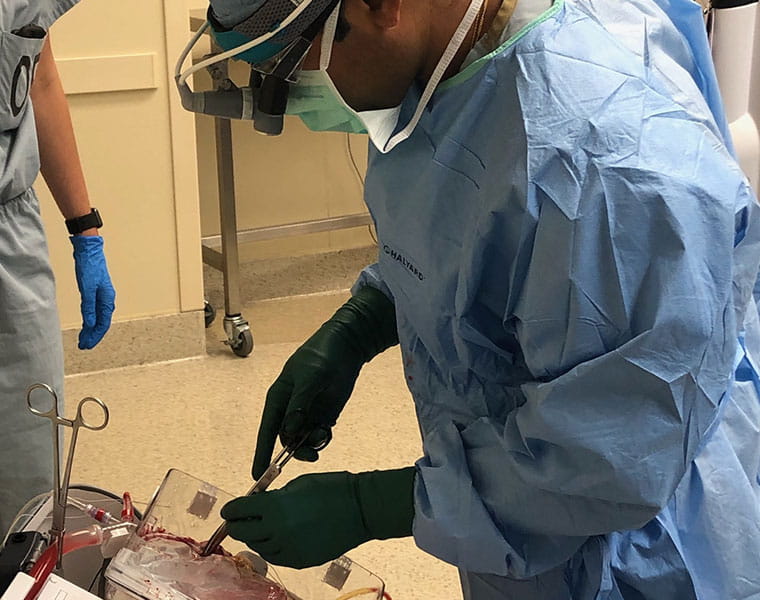COLUMBUS, Ohio – Heart surgeons at The Ohio State University Wexner Medical Center are the first in central Ohio to use a novel organ monitoring system that preserves hearts donated for transplant up to three times longer than current methods. The "heart in a box" technology being tested in a clinical trial at the Richard M. Ross Heart Hospital gave surgeons access to an out-of-state donor heart, which was recently transplanted into a 63-year-old Rockbridge patient hospitalized on mechanical heart support.
 "This novel technology has the potential to greatly increase our heart transplant donor pool because we can go farther away to get hearts that are the best fit for our patients," said Dr. Asvin Ganapathi, cardiothoracic surgeon at the Oho State Wexner Medical Center and assistant professor of surgery at The Ohio State University College of Medicine. "The current method of transporting hearts is to put them on ice and usually you have just four hours to remove and transplant them."
"This novel technology has the potential to greatly increase our heart transplant donor pool because we can go farther away to get hearts that are the best fit for our patients," said Dr. Asvin Ganapathi, cardiothoracic surgeon at the Oho State Wexner Medical Center and assistant professor of surgery at The Ohio State University College of Medicine. "The current method of transporting hearts is to put them on ice and usually you have just four hours to remove and transplant them."
Transmedics' Organ Care System is a portable warm perfusion and monitoring system that keeps donor hearts at a human-like, metabolically active state. The Ohio State Wexner Medical Center is one of 18 sites in North America currently participating in the clinical trial assessing the effectiveness of the monitoring system. It's been successfully used on hearts that were donated after circulatory death (when the heart and circulation stop) and "revived" in the monitoring system. Heart transplants typically come from patients who are declared brain dead but their heart continues to beat.
"This novel system has several advantages," said Ganapathi, local principal investigator of the clinical trial. "It allows for more time for removal and transplantation of hearts as well as evaluation from the surgical team on whether hearts from extended criteria donors are viable enough for successful transplantation. Having access to circulatory death hearts could also greatly increase the donor pool and number of transplants in the U.S."
 Ganapathi and a team traveled to another state to remove the donor heart and then monitored it in the heart box en route to Ohio and during the operation with the help of Ohio State's Organ Recovery Team, a research coordinator, a perfusionist and a registered nurse first assistant. Ganapathi and Dr. Nahush Mokadam, division director and the G.S. Kakos, MD and T.E. Williams, Jr., MD, PhD Endowed Professor in Cardiac Surgery at the Ohio State Wexner Medical Center, performed the transplant July 17.
Ganapathi and a team traveled to another state to remove the donor heart and then monitored it in the heart box en route to Ohio and during the operation with the help of Ohio State's Organ Recovery Team, a research coordinator, a perfusionist and a registered nurse first assistant. Ganapathi and Dr. Nahush Mokadam, division director and the G.S. Kakos, MD and T.E. Williams, Jr., MD, PhD Endowed Professor in Cardiac Surgery at the Ohio State Wexner Medical Center, performed the transplant July 17.
"Participating in clinical trials like this allows us to offer the most recent and promising technology to our patients, which ties in with our goal of providing the best care possible for our patients," Mokadam said. "This type of technology opens the door for us to perform more heart operations."
Surgeons at the Ohio State Wexner Medical Center Comprehensive Transplant Center have performed 592 heart transplants to date. Last year U.S. surgeons performed 3,658 heart transplants, an increase of 3% from 2019, according to the United Network for Organ Sharing.
The Ohio State Wexner Medical Center's participation in the trial was partially funded through philanthropy.






